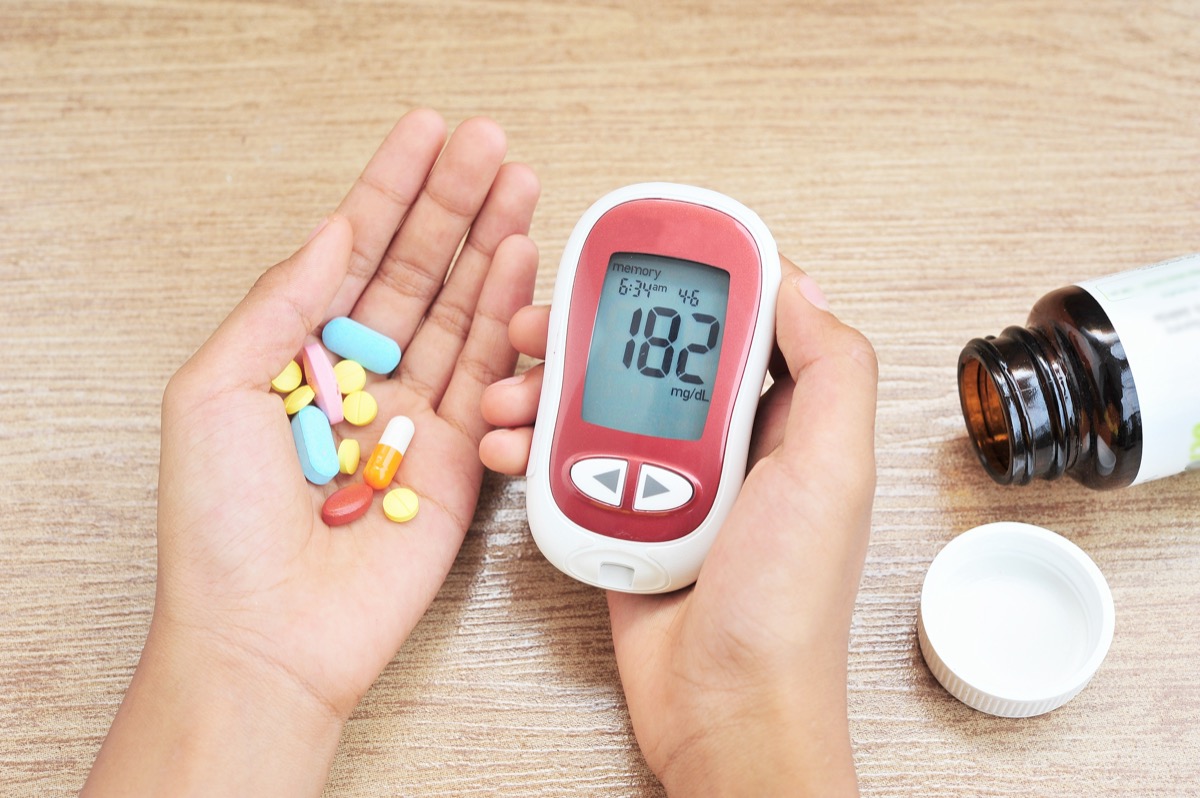An alteration to your sense of taste can be due to your body failing to regulate its blood sugar levels, a potential sign of diabetes. Typically, that will manifest in a sweet taste in your mouth. Your pancreas, which is located inside the abdomen, plays a huge role in digestion, and produces a hormone called glucagon. This works with the hormone insulin to regulate your body’s blood sugar levels. Insulin prevents blood sugar levels from going too high and glucagon keeps them from dropping too low. “Those hormones can get out of whack with diabetes and that could cause higher blood sugar levels that can result in a sweet taste in the mouth,” Philip Junglas, MD, of the Cleveland Clinic warns. One particular diabetes-related issued, diabetic ketoacidosis (DKA), is sparked by high blood sugar levels and can lead to “a sort of sweet, fruity-smell on the breath which can also cause a sweet taste in the mouth,” Junglas says. And for more on what could put you at risk, check out If You Have This Blood Type, You’re High Risk for Diabetes, Study Says. The forums at Diabetes U.K. have a number of posts from newly diagnosed diabetics with this odd symptom. “At all times, I have a very sweet taste in my mouth and on my lips. It’s like I’ve been eating pure sugar or sweetener,” writes one. “I get a sweet taste often in the mornings,” writes another.ae0fcc31ae342fd3a1346ebb1f342fcb “You may experience a fruity taste in your mouth that persists even after you’ve brushed your teeth,” Mehmet Oz, MD, a cardiothoracic survey specialist and host of The Dr. Oz Show, writes on his website. “This symptom can result in a diabetic coma if left untreated.” And for more up-to-date health information, sign up for our daily newsletter. Data from the Centers for Disease Control and Prevention has revealed that more than 34 million Americans have diabetes (around one in 10 of the population). In 90-95 percent of these cases, the patient is diagnosed with type 2 diabetes. This commonly develops in patients over 45, however, it’s come up more and more in children and young adults. According to the CDC, the condition can develop silently because the symptoms can be difficult to spot. “Type 2 diabetes symptoms often develop over several years and can go on for a long time without being noticed (sometimes there aren’t any noticeable symptoms at all),” the public health agency warns. “It’s important to know the risk factors and to see your doctor to get your blood sugar tested if you have any of them.” And for another sign your health is in trouble, check out If You Can’t Do This in 90 Seconds, Your Heart Is in Danger, Study Says. If you’re experiencing an unexplained sweet flavor in your mouth on a regular basis, it calls for an investigation. While metabolic causes like diabetes are possible, Healthline also warns that similar symptoms can arise from infections in the sinuses, viruses, neurological problems (stroke, epilepsy, etc.), stomach acid issues, or even pregnancy. The most likely course of action will be blood tests to check your hormone and blood sugar levels, followed by the appropriate treatment after an official diagnosis. Healthline recommends seeing a primary care physician or a specialist if you suspect the sweet taste in your mouth is not just the remnants of dessert. And for more subtle symptoms you could be ignoring, If You Notice This on Your Nails, Get Your Thyroid Checked, Doctors Say.



